Baylor College of Medicine
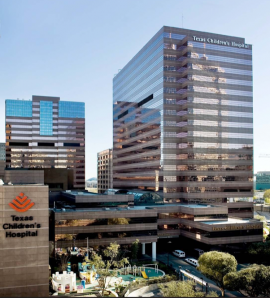
Our Program
Location
Texas Children's Hospital is located near downtown Houston in the Texas Medical Center, the largest medical center in the world and is one of the most expansive and most comprehensive specialty pediatric health care organizations in the nation, with more than 3.7 million patient encounters in 2017. The Texas Children’s Health Centers, Specialty Care and Urgent Care locations provide enhanced access to care throughout the Greater Houston Community.
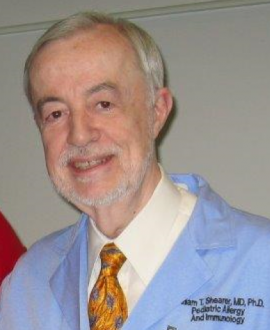
The TCH program is dedicated to leading in the provision of innovative, client-centered care, research and prevention programs that improve the health and quality of life for children, youth, young adults, pregnant women and families living with or affected by HIV, or at risk for HIV-infection. The TCH program is affiliated with the National Institutes of Health (NIH) as a research site which assures access to the newest investigational drugs and to the most recent developments in the treatment of HIV disease. The program is a nationally recognized clinical trials site for several research networks: IMPAACT (International Maternal, Adolescent and Pediatric AIDS Clinical Trials), PHACS (Pediatric HIV AIDS Cohort Studies) and ATN (Adolescent Trials Network). TCH collaborates with County, City and State entities to promote testing for HIV in infants, children, pregnant women and youth and to advocate for testing and prevention including providing PrEP for youth.
Our Staff
Our program at Texas Children’s Hospital/Baylor College of Medicine (TCH) was founded in the late 1980s by William T. Shearer, MD, PhD, who identified the newly emerging secondary immunodeficiency caused by infection with HIV in some of his patients. Our program lost Dr. Shearer in 2018 but our founder’s legacy will forever be an inspiration to us as we continue to foster excellence in clinical care and scientific discovery on behalf of the patients that he cherished.
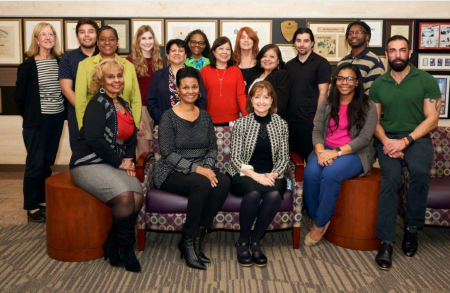
A native Texan, Dr. Mary E. Paul, MD, Director of HIV Clinical Research in the Section of Immunology, Allergy, Rheumatology and Retrovirology, and TCH PHACS Site PI, has provided clinical care and conducted research in women, youth, children, and infants who have HIV or are at risk for HIV for over 25 years at TCH. In addition to the TCH PHACS AMP and SMAART grants, Dr. Paul is site principal investigator for the Baylor Adolescent Trials Network grant, funded through the UNC Itech U19, the ZIKA study, Ryan White Part D and for the Baylor International Maternal, Pediatric, Adolescent AIDS Clinical Trials (IMPAACT) group. She is a vice chair of the Working Group on Pediatric Antiretroviral Therapy and Medical Management of HIV-Infected Children. This is the Working Group of the Office of AIDS Research Advisory Council (OARAC) of the NIH Guidelines for the use of Antiretroviral Agents in Pediatric HIV Infection. Her goals for the TCH program are to continue to develop, conduct, and disseminate results of trials to decrease the impact of HIV in the lives of infants, women, adolescents and young adults by addressing multiple determinants that decrease access and uptake of prevention and care services and by working to improve therapy.
Read more about Baylor staff
Chivon McMullen-Jackson, RN, BSN, CCRP is the Assistant Director of Research. She received her Bachelor of Science Degree in Nursing from Tennessee State University. She has over 20 years of progressive experience in Pediatric Nursing with 15 years of specialized experience in HIV/AIDS research, including IMPAACT and PHACS clinical research site coordinator. She is a Certified Clinical Research Professional and is currently enrolled in Johns Hopkins University Masters in Research Administration program. Chivon is an advocate for the care, education, empowerment and research for all infants, children women and men infected and affected by HIV/AIDS. She is planning and organizing an annual Youth Education Workshop to provide scholarships named in honor of Norma Cooper, our former PHACS Coordinator.
Theresa Aldape, LMSW is a social worker in the Immunology, Allergy, Rheumatology and Retrovirology Department at Texas Children’s Hospital. Ms. Aldape began her career at Ben Taub General Hospital in Houston, Texas in 1984. She worked in pediatrics and therefore worked closely with the Immunology Team providing care to the children being diagnosed with HIV. She was recruited by I. Celine Hanson, M.D. to work with Dr. Shearer and the Immunology Team participating in HIV research in 1989. Ms. Aldape developed the Community Advisory Board at Texas Children’s Hospital in 1991, as it began evident that consumer engagement was vital to the success of the HIV research program at Texas Children’s Hospital. Theresa Aldape, LMSW has provided social work services to over 500 children with HIV/AIDS in Houston and surrounding areas.
Carlis Polk, BSW has been a Ryan White Part D case manager with TCH for 20 years. She provides emotional support and case management to families with HIV infected infants, children and adolescents. She has provided comprehensive assessments and has linked and referred all patients to services as needed. Ms. Polk has also assisted HIV patients and HIV exposed patients. This includes linkage to inner hospital departments and other community services. She has assisted patients with applications and insurance issues and provided patients with HIV 101 education.
Gloria Sierra BA, MPH has been a Ryan White Part D case manager at TCH since 1997 and more recently manages the Ryan White Program and organizes and conducts educational programs for families and youth in addition to her case management work. Her education workshop included Spanish Mother & Daughter Health Education and Resiliency to address their understanding their own thoughts and beliefs and how it influences their feelings along with viral suppression, retention in care and medications adherence in living with HIV/AIDS. A Young Girl Health Education and Resiliency will begin this January, 2019. I also had a Transition Summit to address the growing population of youth transitioning to adult care from pediatric care. Education workshop were also held for Birth Control (Female & Male separate) and Treatment Adherence for youth having difficulties with their medication by address their challenges.
Felicia Cerf, MSW, BSW has been a Ryan White Part D funded case manager at TCH since 2005. She provides medically based case management services designed to assist pediatric patients, adolescents, adults and their families with the psychosocial, emotional, financial and environmental aspects of HIV disease in the Retrovirology department, assure continuity of care planning and coordination of needed community services, participate in interdisciplinary care planning and collaboration to ensure effective and efficient coordination of inpatient and ambulatory care resources.
Luis Lopez has been a Ryan White funded patient navigator for the TCH program for several years. He assists newly or previously diagnosed HIV positive patients in transitioning, establishing and maintaining primary care, as well as increasing their access to services to ensure continuum of care. He is responsible for providing support in coordination of care activities and assisting patients to navigate through all the steps in obtaining the necessary and appropriate care.
Shelley Buschur RN, CNM has been a nurse since 1984 and a certified nurse midwife since 1987. Shelley had been practicing clinical midwifery for a decade and working with HIV+ women for 4 years, when she joined the Baylor College of Medicine/Texas Children’s Hospital HIV Clinical Research Team in 1998. Her passion is working with HIV+ mothers during pregnancy and postpartum. She enjoys providing health and pregnancy-related anticipatory guidance while conducting perinatal HIV studies which enhance the scientific understanding of the impact of HIV on pregnancy outcomes and antiretroviral pharmacology. Shelley is primarily involved in recruitment and following families for the SMARTT Dynamic cohort for PHACS.
Terry Raburn, RN, BSN is a pediatric and clinical research nurse with thirty years of experience in the field of HIV. She is dedicated to working with the PHACS protocols to enhance research in pediatric, adolescent, and maternal HIV care.
Ruth Eser-Jose, MSN, RN, CPN is a Research Nurse who joined the HIV Research team in 2015. Currently, she conducts studies for PHACS and IMPAACT.
Kathy Pitts, PhD, CPNP, MPH has been with the Section of immunology, Allergy, Rheumatology & Retrovirology and TCH PHACS Site 19 since 2008. She works with both the case managers, social workers and research nursing coordinators performing the physical exams, completing CRF’s and basic measurements of research study participants. Additionally she addresses and treats the acute care needs of families/participants who are part of the PHACS network research protocols.
Lynette Harris, PhD is a Psychologist whose research interests involve neuropsychological sequelae of chronic medical conditions. Current projects focus heavily on perinatal HIV/AIDS, such as interplay of fatigue, sleep disturbance and neurocognition; prospective memory and executive functioning; and epidemiology and neurobehavioral factors related to treatment adherence. She also has interests in quality of life associated with chronic medical conditions. Dr. Harris has performed and supervised neuropsychological evaluations for PHACs at Texas Children’s Hospital since the start of the grant
Mariam Pontifes, CCRP is a Senior Project Manager who has worked in Pediatric Research for 20+ years. She enjoys research patient’s visits and has a strong passion for patient care and research. She is also a Bilingual Health Care Spanish Provider.
Mandi Speer, MPH joined the PHACS team at Texas Children’s in February 2018. Currently, she conducts all the AMP UP and Oral Health Follow-Up sub-study visits, as well as sees a few participants on the SMARTT study. Though she’s only been with the team for a relatively short time, she has enjoyed learning about the different aspects of HIV research and getting to know the families at Texas Children’s.
Dalisa Santiago, MBA serves as a Senior Research Coordinator and has been at Texas Children’s for 3 years. She is the lead study coordinator for the Baylor Adolescent Trials Network (ATN). In addition, Ms. Santiago serves as the Youth Community Advisory Board facilitator where she engages youth in HIV health education, research, and risk reduction. She also assists with supervision of Ryan White HIV medical case management. Ms. Santiago earned her Bachelors of Science in Biology from Edward Waters College, and completed her Master’s in Business Administration from University of Phoenix.
Rogelio Hernandez-Gutierrez works as a Research Coordinator for the Baylor Adolescent Trials Network (ATN). Rogelio studied Medicine at the Universidad Popular Autonoma del Estado de Puebla in Mexico. For his fifth year of education he performed a one year rotation at several hospitals in the Texas Medical Center.
Renee Ali, AAS joined Texas Children’s Hospital/Baylor College of Medicine in 1999 and has been working as the Regulatory Affairs Coordinator in our department for about 15 years. She provides regulatory support for a variety of networks including the IMPAACT and PHACS studies. She finds joy in her job is knowing that what she does contributes to better health for our patients and families.
Joseph Carnot has been with Immunology, Allergy, Rheumatology and Retrovirology at Baylor College of Medicine and Texas Children’s Hospital for 20+ years. He started in the laboratory section of the research group working up towards becoming the data manager for the Pediatrics HIV research group section. He is responsible for assisting in the startup and finish of research studies that include enrolling subjects, processing laboratory samples for the studies, process of quarterly IQA PBMC Cryopreservation Proficiency Testing Program, shipping out samples real time or on request and data entry of patient information pertaining to the study.
Reggie Fontenot is a Data Management Coordinator for the Immunology, Allergy, Rheumatology and Retrovirology Department at Texas Children’s Hospital. He provide support for data research as well as administrative duties.
Our CAB
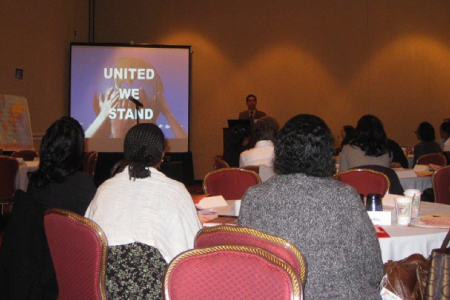
Established in 1991, the HIV Research Community Advisory Board at Texas Children’s Hospital/Baylor College of Medicine continues to have monthly meetings to obtain input from community about our clinical program and about research including PHACS, IMPAACT, ZIKA, ATN and RW Part D projects. Our principal investigator, co-investigators, research nurses and psychologist attend CAB meetings to discuss the current and upcoming studies. They address concerns and gaps in services affecting our families living with HIV/AIDS. In addition, we have a separate meeting of our Youth CAB once a month. Conducted at fun venues, like a bowling alley or game center, away from the Medical Center, the Youth CAB focuses on concerns of maturing youth and studies of the ATN. Once or twice a year, we have a large CAB meeting and invite community agency representatives so they can provide information about their services. This year the invited guest speakers focused on the neurodevelopmental concerns of children and adolescents with HIV, overcoming stigma and discrimination and accessing psychological, psychiatric and clinical social work services at Texas Children’s Hospital for our research and clinical patients.
Read more about our CAB
We have several CAB members who have been nationally recognized for their work in local, state and national CAB activities. Two of our CAB members were elected and completed their terms as the Chair and Co-Chair of the National PHACS CAB. One of our young adults was elected as the Vice-Chair of the PHACS Youth CAB and attended the PHACS Youth CAB in 2018. In October 2018, the CAB members reported their experiences and information about the various sessions and retreat they attended at the annual scientific meetings. Several of our local CAB members are interested in joining the PHACS working groups this coming year.
The CAB members have also represented our site at the IMPAACT Scientific meetings and CAB Retreats. The TCH/BCM CAB Chair is also the IMPAACT ICAB Chair, the ICAB representative on the IMPAACT 2002 protocol team and also was a member on the writing team for a paper about ARVs and children with HIV. She co-facilitated the IMPAACT ICAB retreat and she was recognized for her outstanding leadership as the ICAB Chair. Recently, she was elected to join the National Pediatric HIV Antiretroviral Panel. During the TCH/BCM CAB meeting in June 2018 the CAB chair and liaison focused on sharing information received at the IMPAACT Annual Meeting and CAB Retreat.
Locally, CAB members are invited to volunteer at all of the hospital and community events, including the AIDS Walk Houston, AIDS Awareness Day at Texas Children’s Hospital and health fairs in the city. During the CAB meetings we celebrate major milestones such as birthdays, graduations from elementary, middle and high-school, acceptance into college/university or community colleges and also the achievements of our campers at CAMP HOPE in Brenham, Texas.
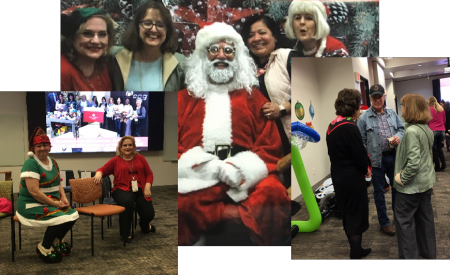
We began having holiday parties for our patients in 1988. This year we had over 125 people at our 30th Annual Holiday Party. We had a photo booth so the children and their families could take a photo with Santa Claus and share it with their extended family members. The children received a stocking and toy from Santa Claus. They played games, and the parents enjoyed their prizes while they played bingo. Some of our young adult patients volunteer to help with games, the toy give-away and musical chairs. Local high school students also volunteer and everyone is given a certificate of appreciation. We encourage our volunteers to keep their certificates for future reference as they apply for employment, future volunteer opportunities and institutions of higher education.
We look forward to the upcoming clinical trials and natural history studies in PHACS and IMPAACT, ATN and ZIKA. The CAB members are extremely energetic and dedicated to learn further about the new studies. They contribute toward the final version of studies by reviewing upcoming clinical trials, natural history studies and lay summaries. The TCH/BCM Community Advisory Board members continue to shine in Houston, Texas and also at a national and international level.
How would you describe your staff?
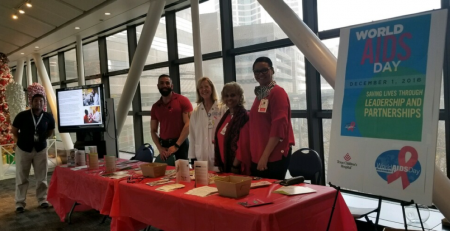
Wonderful, compassionate, diverse, dedicated, caring, willing to "go the extra step" to help families about arranging appointments, offering help for referrals, resources and listening to specific concerns they may have regarding daily struggles of life, offering positive reinforcement for their parenting (many of the participants are single moms and encouraging them to care of themselves goes a long way to let them know that you recognize the struggles they may be undergoing), empathize with families if they have to reschedule but not blame or criticize, and offering mental health dialogue with each visit as they need. Taking the time to provide support and encouragement forms a bond with participants that lets them know that our team cares.
What events are coming up for your clinic?
- The upcoming Community Advisory Board monthly meetings will be held January – March 2019. We will celebrate New Year’s 2019, Valentine’s Day, Mardi Gras and St. Patrick’s Day. We also look forward to acknowledging the CAB member’s birthdays during the first part of 2019.
- In 2019, current and upcoming research studies will be discussed at our Community Advisory Board meetings at Texas Children’s Hospital.
- The 2019 AIDS Walk Houston will be held on March 3rd.
Tips from Texas Children's Staff and CAB
What tips can your site share on how to make a study visit run smoothly?
- Make the family feel as comfortable as possible, be glad to see them even if they are late, point out positives about their parenting and ask mother what three adjectives describe their child (positives). Find something wonderful to point out to the parent about their child. Be willing to listen to what is going well and poorly for them as a family.
- When scheduling a visit date, be understanding of the participant’s personal schedule as they live with other responsibilities that obligate their time.
- Once the study visit is scheduled, do a follow-up contact like a phone call or text a few days before the visit to remind the parent or participant.
- Prepare for study visits multiple days in advance. If you wait until the last minute to prepare, you run the risk of something else coming up that will prevent you from being fully prepared.
- Communicate with each other. We each know when someone has a study visit, and we’re always willing to help if needed.
- When possible, have the caregiver or study participant leave additional children at home. Bringing along siblings or additional children can be stressful for the caregiver and distracting to the study visit. However, we recognize that childcare can be difficult to arrange, so it’s important to be flexible if additional children are brought to the visit.
- Work as a team to help each other with visits that are very complicated.
- Have everything for the visit prepared prior to the visit (ex. Labels, paperwork, questionnaires, computers, tubes for blood, ND forms, remunerations, etc.)
- Make a checklist to make sure that everything is prepared for the visit.
How does your research team make study visits comfortable for families?
- Offer snacks and drinks for the children, have little gifts that you can leave them with a happy remembrance of the visit, we support one another (staff) if problems arise, always willing to call one another for help if needed, explain how visit will go overall for each visit (so family can anticipate length of time that will be spent there & what will occur), offer positive reinforcement for the growth and development that one sees in the children.
- We offer complimentary valet parking to our study participants so that do not have to worry about finding parking.
- If a family is uncomfortable with navigating the hospital corridors, we offer to meet them at valet parking and escort them to their study visit.
- We also coordinate study visits with clinical care visits as much as possible to prevent families from having to make multiple trips into the medical center.
- When families come in for a study visit, we always do our best to acknowledge and show our gratitude for them taking the time to come in. We make sure to offer them something to drink or snack on.
- Families appreciate when you tell them at the start of the visit exactly what will happen at this study visit and about how long it will take. If something happens that will cause the visit to be longer than expected, we check in with them to make sure they are okay to continue today.
- Providing privacy and confidentiality.
- Providing a distraction when children are getting blood drawn (ex. Use cold spray).
Please share some valuable contributions participants have made to improve your site.
- Many of the participants and family members participate in holiday parties and offer help and advice to other family members when they see one another. Involvement of participants in writing up article for newsletters, family meetings and participating for CAB meetings.
- One study participant referred her niece for participation in another study offered at our site.
- Several of our SMARTT participants are active community advisory board members.
- The active participation of our CAB members has improved our site.

